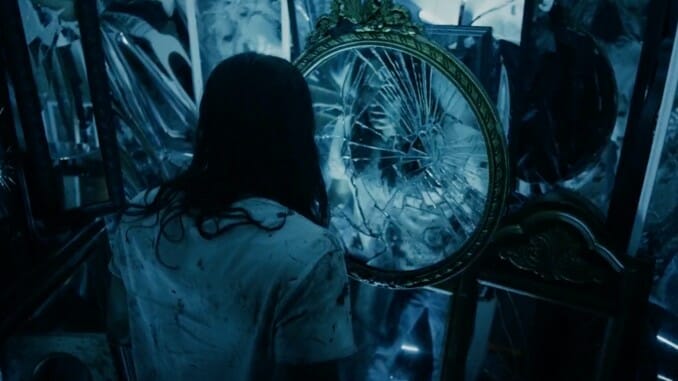You Should Be One of Those Who Walk Away from This Underwhelming Horror

Robert Rippberger calls upon the single-take aesthetic of experiments like Silent House and Let’s Scare Julie in 2022’s latest attempt at hiding edit cuts, Those Who Walk Away. It’s not one continuous shoot like Let’s Scare Julie, merely a blend of expanded sequences that hope to induce an accelerating sense of mania as characters waltz through haunted house spooks. Or, more appropriately, that’s the intent once Rippberger actually reaches his slovenly supernatural abode. It takes a whopping 45 minutes—half the film’s running time—to summon a fiend dubbed “Rotcreep” (Nils Allen Stewart) from beneath stained wooden floorboards. Sadly, it’s far too late, given how the preceding events feel torn from a mumblecore romantic dramedy.
Max (Booboo Stewart) and Avery (Scarlett Sperduto) are meeting outside digital dating app text boxes for the first time. It’s awkward. Mouths stammer, with hearts set on a local retro screening of Evil Dead. Upon reaching the movie theater, bad news presents itself as a bomb threat and indefinite closure. Avery suggests alternate plans to investigate another local landmark where paranormal occurrences could spice up the night. Max refuses to shy away, trying to impress the girl of his dreams, except their profoundly connected traumas—Max’s abandonment of his mother with Huntington’s disease—may awaken unkillable evils that threaten foolish lovebirds.
Those Who Walk Away cuts a wicked trailer where continual takes suggest this maze-like descent into a nightmarish structure. It’s the reason I’m writing this review. Rippberger entices through bold ambition and doesn’t shy away from cinematography that would make most camera operators buckle under pressure, but fails to understand how long our attention spans might endure. Stewart and Sperduto spend what feels like ages stuttering through cringy first-date chatter while moseying around small-town main roads, which is a death knell to momentum that never amasses. It’s aimless and increasingly dull—and also needless by the time Rippberger even introduces the impetus behind Avery’s romantic redirect as afternoon turns to nightfall.
-

-

-

-

-

-

-

-

-

-

-

-

-

-

-

-

-

-

-

-

-

-

-

-

-

-

-

-

-

-

-

-

-

-

-

-

-

-

-

-








































